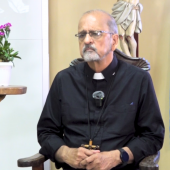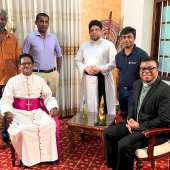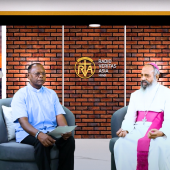Synod a call to build a ‘Church of disciples,’ says Malaysian bishop
The traditional threefold concept of the Catholic Church involving the clergy, religious, and laity has served the faithful for a long time. But for a Malaysian bishop, the upcoming Synod of Bishops may be leading us in a new direction to build "a Church of disciples."
"The reports coming in from various consultations about the Synod are going back to a very basic area [of] discipleship, [which is] based on Baptism," said Penang Bishop and Cardinal-Elect Sebastian Francis in an interview with Radio Veritas Asia.
Bishop Francis said that with the 16th Ordinary Synod of Bishops in October focusing on synodality, the Church must actively open up and reach out to create disciples of today, regardless of their culture or religion.
He said that this mission is especially important in Asia, where Catholics are mostly a minority.
"We are constantly reaching out beyond the Church, [and in Asia]. We want to tell the story of Jesus without imposing it on anyone… [and] to everyone who wants to listen," the prelate said.
"I suggest we need a very strong vision of the Church, and that vision is a Church of apostles… disciples... and the people of God," he further said. "It’s a very inclusive understanding of the Church and not just the traditional… Church of clergy, religious, and laity."
Turning his focus on the youth, the bishop explained that young people must not be seen as "leaders of tomorrow" but rather as "young disciples of today."
"They are called to be missionaries of the joy of the Gospel today, not tomorrow," said Bishop Francis.
"So many countries in Asia and beyond are badly in need of hope, and I think our young people must be fired up with the Holy Spirit so they can become missionaries of hope," he further said.
The bishop also revealed that the celebration of the 50th anniversary of the Federation of Asian Bishops’ Conference (FABC) and their general assembly last year gave him renewed confidence in building a Synodal Church.
"I can sense a bond that has taken place among bishops of Asia," he said. "Now we know one another, we feel that we must have an Asian identity for our Church. We are responsible for this. We have to give the direction for the Church in Asia to be Asian."
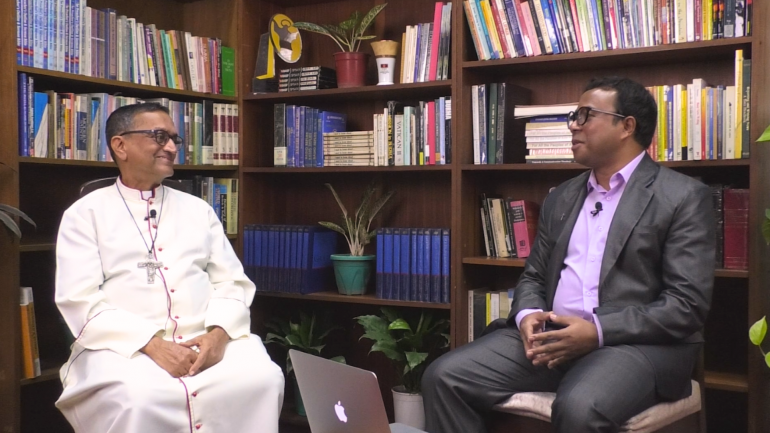
Moreover, Bishop Francis, who currently serves as chairman of FABC’s Office of Social Communications, reiterated the importance of utilizing digital media to spread the Good News, especially to Asians who are most “interrelated with the values of the Gospel.”
“It would almost be irresponsible not to engage the instruments that are available to us in this digital age to use this as a means to proclaim the Gospel, to share the story of Jesus, and to promote all the values that we share as Asians,” he said.
He noted the vital role of Radio Veritas Asia in this matter, especially with the organization’s wider scope and reach through its transition to digital media.
“My wish and prayer for all viewers of Radio Veritas Asia is [to have] a relationship [and] encounter with you,” he said. “It will be more than just technical. It will be a real encounter with individuals, communities, and cultures, with an opportunity to have spiritual conversations that will become very important at FABC.”
Read the full transcript of the interview below.
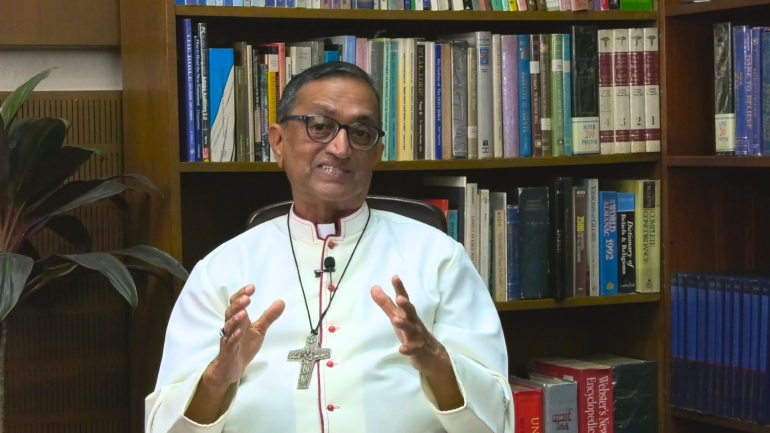
VOICE OF ASIAN BISHOPS
RVA Interview with Cardinal-elect Sebastian Francis of Penang by Fr. Kasmir Nema, SVD, from Radio Veritas Asia.
Fr. Kasmir Nema: It's great to know that Bishop in Malaysia and Singapore and of course Brunei, you know, Pope Francis proposed a synodal path of the universal church, still an ongoing process. It is aimed at a way of approaching our mission. You know. If I ask you what is the synod of church, do you Bishop?
Cardinal-elect Francis:
I have been suggesting at many different forums, including FABC and at the level of the Catholic Bishops Conference of Malaysia, Singapore, and Brunei, that the various platforms that are available within Malaysia and in my own diocese that I think we need a paradigm shift and which comes with a paradigm conversion. And of course, the central church is about listening, it's about dialogue, it's about journeying together, but it is also about making decisions and moving forward where the spirit is leading the church in Malaysia, all in Asia.
And I have I'm quite excited about the idea that we need a paradigm understanding of the church. And for a long time, we have been comfortable with the concept that the church is the church of clergy, religious, and laity, and that has served us well. But maybe the Holy Spirit is now moving us in a certain direction. And I have suggested that maybe we should go back to the Gospels now and start reflecting on the church of apostles. And the successes of the apostles are the bishops, and they must lead. They must lead a church of disciples. The reports coming in from the various consultations about the Synod go back to a very basic area, and it is called discipleship, discipleship is based on baptism, therefore, we are the church first of apostles. Secondly, we are a church of disciples.
All of us, our clergy, religious laity, our church of disciples. But this is a church that is not just inward-looking, especially for us in Asia, where it appears that we are a minority, except for the Philippines, in East Timor, and the rest in the rest of Asia. We are a minority. Therefore, the church is also opening and reaching out to the people of God, a church that is always open to God's people of whatever culture, whatever religion, whatever.
And what Pope Francis calls for Fratelli Tutti that we are constantly we are reaching out beyond the church and we want to share, as in Asia, we see we want to tell the story of Jesus without imposing it on anyone, to tell the story of Jesus to everyone who wants to listen. So, it's that kind of orientation or direction that I just read the instrumental laborious, and it is quite exciting that the instrumental laboratories which will be debated in October in Rome, that the focus is not so much on more documents, but the focus is on how are we going to be church universal? How are we going to be the church in Asia? And the how maybe is more important than the what? So, I suggest we need a very strong vision of the church. And that vision is a church of apostles, a church of disciples, and a church of the people of God. So, it's a very inclusive understanding of the church and not just the traditional, which was good in the past of the church of clergy, religious, and laity.
Fr. Kasmir Nema: Speaking of paradigms, of the church of discipleship, of people of God in line with this synodal church, If I ask, what would be your suggestions to the church leaders in Asia and also around the world to make them more synodal in their ministries in more practical ways?
Cardinal-elect Francis:
Yeah, practical, but based on a solid understanding of communion mission and participation, which is the key ideas that are moving the church forward to the Senate. Now that I've always said that before we go into practicalities, we must be convinced that the continued vision of the mission of Jesus Christ has been entrusted by God the Father, and by God the Son, primarily to the Holy Spirit. And therefore, we must believe in this mission and trust that by the Father and the Son first, the Holy Spirit will succeed, because it has been given in the first place to the Holy Spirit and through the Holy Spirit, to the Church and to all who seek God with a sincere heart.
That must be the basis, really. And so, whatever we do on a day-to-day basis in terms of living this mission, it is really being very sensitive to what the Holy Spirit is not only saying to the Church of Asia and the world but how the Holy Spirit is leading the mission towards its fulfillment. So, it must have a very lively relationship both with the Holy Spirit and with the people of God.
Fr. Kasmir Nema: Let's move to the other questions related to your role, you have been named the chairman of FABC OSC. What new leadership qualities you have implemented you going to implement in this office?
Cardinal-elect Francis:
Yeah, for the time being, as we know this FABC and FABC, OSC, and Radio Veritas Asia, are going through a review. It's a time of maybe slowing down a little bit and reviewing what is going on so that we will have the confidence to move forward with, with great certainty, a renewed understanding of our mission. So FABC has become quite strong once again, especially after we celebrated FABC 50 where about 200 bishops gathered in Thailand and we spent 20 days together.
Now, that seemed to have done something to the Church of Asia. It has brought the bishops of Asia physically to live together for 20 days. And though it seemed very long and initially we were having our hesitations and so on and so forth, we persevered and we stayed together. And I can sense a bond that has taken place among bishops of Asia. Now we know one another and we feel that we must have an Asian identity for our church. And we are responsible for this. We have to give the direction for the church in Asia to be Asian, to be Asian.
And therefore, I see much hope not only for the Office of Social Communications but for all the structures of FABC. And we are beginning to feel that we need to speak with one voice for the Church of Asia and Radio Veritas issues. These are directing a sign of something that is, in reality, happening where the Church of Asia is able to proclaim the gospel into Asia in a very cultural be so
Fr. Kasmir Nema: Still in line with your role as FABC OSC. What is your message for the Catholic Communicator or those involved with the Communication Ministry?
Cardinal-elect Francis: Yes, we can be focusing on the pitfalls of the digital age and the dangers and so on and so forth. But I think we can't give that as an excuse for not using the technology that the digital age is giving us as a solid, concrete, tangible way of sharing the gospel with the people of Asia. So, it would almost be irresponsible not to engage the instruments that are available to us in this digital age to use this as a means to proclaim the gospel, to share the story of Jesus and to promote all the values that we share as Asians, which are so inter-related with the values of the gospel.
So that's my hope to build upon the past, to build upon the past, and to just continue with the tradition that has already been put into place in the various offices of the FABC, including the Office for Social Com Communication, and to be very aware of the good work done by people like you. Yeah, well, part of this great mission for the Church of Asia and beyond and beyond because we have a message not only to Asia but from Asia to the world and to the universal church and if we don't speak for Asia, who will speak for each?
Fr Kasmir Nema: Our final question. I'm, you know, one of the SYNODAL parts requires the importance of laymen involved in the church, particularly the youth. Can you tell us how the youth have been involved in you, in your diocese Bishop? and their activities?
Cardinal-elect Francis:
Yeah. Well, I don't like the word. The youth of today are the leaders of tomorrow. I think that's a very subtle way of pushing the youth into some future. I think the youth of today are the young disciples of today, and don't push them into the future. And I think the word the keyword for young people today is that they are called to be young disciples. They are called to be missionaries. The missionaries of the Joy of the Gospel today, not tomorrow. They are called to be missionaries of the mercy of the Father today, and they are called to be missionaries of Hope.
I feel these are the three words that the Spirit has been leading the universal church and the youth of Asia, especially because we are still a fairly big majority in Asia. Young people and young people are the young disciples and are called to be missionaries of joy, the joy of the Gospel of Jesus Christ, missionaries of the mercy of the Father of Jesus Christ, and really spreading a lot of compassion and mercy, especially among fellow young people. And finally, missionaries from all over the world are badly in need of hope. So many countries in Asia and beyond are badly in need of hope, and I think our young people must be fired up with the Holy Spirit so that they can become missionaries of Hope to young people and others.
Fr. Kasmir Nema: Our final question, your message to our viewers Radio Veritas Asia, if given the opportunity to say anything, would like to convey your message to our viewers out there.
Cardinal-elect Francis:
Yeah, I'm aware that you transmit from Radio Veritas Asia 21 and my right language is anyone 21 and English 22 Yeah. So, I'm aware that you have had you have reached almost a million viewers. Yes. Recently. And I'm aware that you are reaching out to countries that way, which are still developing, which are still very rural and which is still the situation in so many countries of Asia. And therefore, thank God for our predecessors who laid the foundations from the Philippines to beam to the whole of Asia. That and especially now that you have gone digital. And actually, there is the potential to reach out to many more now that you are digital with more clarity and so on and so forth.
So, my wish, and my prayer for all viewers of Radio Veritas Asia is that we will have a relationship with you, a relationship, an encounter with you through Radio Veritas, Asia. And it will be more than just technical. It will be a real encounter with individuals, communities, with cultures, with an opportunity to have spiritual conversations that will become very important at FABC. And now I see this come out in the Synod document that that rather than just talk about, you know, having discussions and fewer discussions and endless debates we begin to have conversations that are called spiritual conversations where we share what the spirit is saying to us, all of us together individually as well as a community. So that's my hope that these spiritual conversations will continue through Radio Veritas, Asia, and beyond.
Fr. Kasmir Nema: Bishop Sebastian, thank you very much for being with us today, sharing your ideas, and your thoughts.
I am Father Kasmir Nema, and thanks for watching this program see you next time for more interesting conversations with Asian bishops.
Radio Veritas Asia (RVA), a media platform of the Catholic Church, aims to share Christ. RVA started in 1969 as a continental Catholic radio station to serve Asian countries in their respective local language, thus earning the tag “the Voice of Asian Christianity.” Responding to the emerging context, RVA embraced media platforms to connect with the global Asian audience via its 21 language websites and various social media platforms.









